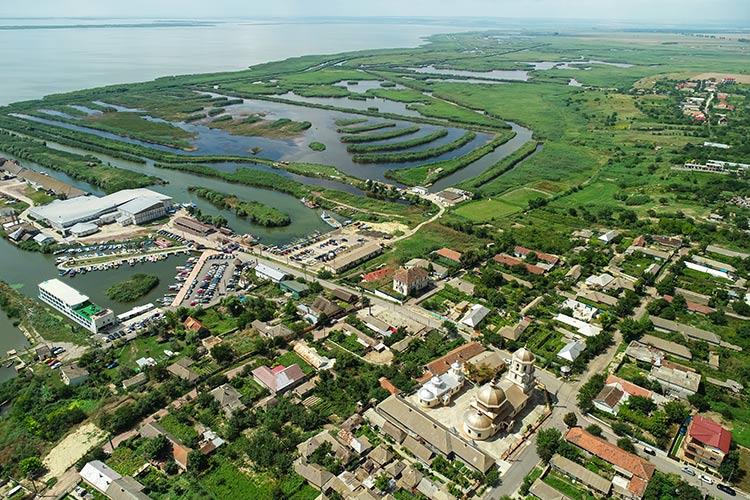As the world recovers from the devastating impacts of the COVID-19 pandemic, putting climate at the heart of development is fundamental to creating a resilient and equitable growth map. While climate mitigation finance or “green” markets have grown exponentially, efforts are now underway to launch and scale climate adaptation finance, especially related to “blue” assets. Given that the oceans and water related economy is expected to reach $3 trillion by 2030, innovative financing solutions such as blue finance can play a key role in Central and Eastern Europe (CEE).
With increased interest from investors, financial institutions, and issuers globally, blue finance is an emerging area in climate finance. As part of this financial instrument, investments are used to finance or refinance activities that can help protect oceans or improve water management. Specifically, blue bonds and blue loans earmark funds exclusively for ocean-friendly projects and to protect critical clean water resources.

Asia, which produces more than 80 percent of the world’s marine-plastic waste, has been at the forefront of the blue economy. Companies focus on expanding their plastics recycling and waste-management capabilities, using marine and coastal resources sustainably, diverting plastic waste from landfills and oceans, tackling marine pollution, and preserving clean water resources.
In CEE, the blue economy is still in its infancy, but there are many opportunities. In the context of the region, focusing beyond the traditional ocean sectors (for example, fisheries) and accelerating investments in land-based and water-related sectors is key. Sectors like agriculture, river pollution, and on-land plastics management can have a massive impact on water resources and cleanliness of our seas and oceans.
As the region aims for a strong economic recovery, facilitating capital for regional banks to provide loans to businesses for blue projects can help strengthen the blue ecosystem. Some of the areas that blue finance can support include water conservation, water management activities, smart drip irrigation, aquaculture, and seafood processing, among others.
Romania is a case in point in the region. To comply with all the European Union requirements relating to the water and wastewater sectors, it will have to invest about €15 billion by 2027. Out of this, at least €3 billion could be provided by private sector financiers. With its water management issues and high vulnerability to droughts, Romania has big needs for blue finance, and blue opportunities are developing across areas—rehabilitation of water supply measures for households and hydroponic urban farming, among others.
These needs represent good business opportunities for banks, especially because compliance with the water-related Sustainable Development Goals is becoming increasingly important for small and medium enterprises (SMEs) in developing countries. For instance, the European Commission’s new strategy for sustainable textile addresses heavy impact on water use, among others. In this context, helping clients to identify and address relevant challenges will enable banks to maintain and grow their SME portfolio.

Further, municipal water infrastructure—supply and sanitation—are the main investment gaps in the region, an opportunity for local banks to provide financing through small-scale public-private partnerships, for example.
Good news is that the blue transformation has started in Europe. Banca Transilvania SA—the largest bank in Romania—recently received a €100 million loan from IFC to support sustainable use of water. An inaugural project in Europe, this investment in blue finance is the first blue funding project by a financial institution in the region. This will help the bank extend loans to smaller businesses and use the proceeds to finance blue projects in Romania.
Water surfing
To ride the blue economy “wave,” financial institutions in the region need to understand their role and how they can support their clients. In CEE, mobilizing finance to help companies and starting a dialogue with commercial partners in the blue sector could facilitate financing in the land-based sectors. Banks also need to understand the challenges that companies face in terms of financing, in particular the challenges their clients may face in identifying what they have to do; and the importance of structuring the financing to meet the recently introduced international blue finance guidelines and simply avoid re-financing issues under blue terms.
Despite the challenges, banks should seize — and invest in — the opportunity. Advising their clients on blue investment opportunities requires specialized know-how and those banks that move first will be able to acquire the ropes faster, building a competitive advantage. Over time, as they demonstrate competence, both the market and regulators will have improved confidence in this sector.
Creating Ripples
Our research suggests that in the next five years, the potential for small and mid-size private sector investments in blue finance—the ones that financial institutions could finance—is around €11-16 billion in five countries, including Romania, Croatia, Poland, Serbia, and Georgia. This includes only municipal and industrial opportunities while excluding major government-led infrastructure initiatives.
Building on this potential, scaling up blue investments will be crucial for the region. As the private sector steps up to create an enabling industry with new opportunities, it will be key to ensuring food security, jobs, and a seamless transition to net zero.
Vittorio Di Bello, Regional Head of Industry for Financial Institutions in Europe, IFC , Photo: shutterstock
